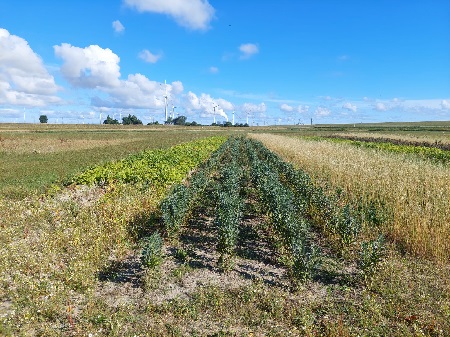Nederlandse partijen bundelen kennis over beheersen van verzilting in delta’s
Door klimaatverandering, zeespiegelstijging en bodemdaling neemt de verzilting van de binnendijkse gronden langs de Nederlandse kust, maar ook in andere delta’s, geleidelijk toe. Hierdoor neemt de beschikbare hoeveelheid zoetwater af. Verzilting maakt ook het grond- en oppervlaktewater minder geschikt voor veel gebruikers. Verzilting leidt tot schade aan landbouwgewassen en bedreigt de voedselproductie. Drie kennisinstituten en drie hogescholen slaan daarom de handen ineen en bundelen hun kracht in het Kenniscluster voor Verziltingsvraagstukken in Delta’s met als doel om zuinig en slim met het beschikbare zoetwater om te leren gaan en ons landbouwsysteem verziltingsbestendig te maken.
Het initiatief is door haar combinatie van toegepaste water-, bodem- en gewaskennis uniek in Nederland en ook internationaal relevant. Delta’s in de wereld ondervinden dezelfde bedreigingen en bestaan in overwegende mate uit kleirijke bodems. Klei is zeer gevoelig voor verzilting. Eenmaal aangetaste grond heeft een slechte structuur, is minder vruchtbaar en dat zal tot lagere opbrengsten en uiteindelijk een lager inkomen van de boer leiden. De toenemende verzilting van grond- en oppervlaktewater verkleint de beschikbaarheid van water voor landbouw en vele andere functies en vraagt om tijdige, robuuste en duurzame oplossingen.

Praktijkkennis
Het accent van het kenniscluster ligt op het zoveel mogelijk beperken van de impact van verzilting op basis van grondig systeembegrip en praktijkkennis (water, bodem en gewas). Hiernaast worden mogelijkheden voor aanpassing van teelten naar meer zilte omstandigheden beschouwd. De toepassing wordt versneld door samen te werken in een Living Lab aan ontwikkeling en evaluatie van doeltreffende maatregelen in de teeltsystemen en in het lokale en regionale waterbeheer.
Door de kennis van Zeeland tot en met Groningen bij elkaar te brengen, door inzet van toonaangevende en internationaal werkende kennispartners, beschikt het kenniscluster over cruciale bouwstenen voor het vraagstuk van toenemende verzilting en beschikbaarheid van zoetwater. De partners gaan met overheden en bedrijfsleven werken aan een Nationale Kennisagenda rond Verzilting. Het Kenniscluster bevordert de samenhang en samenwerking in onderzoek en in projecten.

Partners
De provincie Fryslân heeft als initiatiefnemer de start mogelijk gemaakt. Het inhoudelijke werk van het Kenniscluster wordt mogelijk gemaakt door haar “founding partners’ die menskracht beschikbaar stellen voor een vliegende start. Dit zijn Rijksuniversiteit Groningen, Deltares, Wageningen University & Research, Hogeschool Van Hall Larenstein, Hanzehogeschool, HZ University of Applied Sciences. Het Kenniscluster nodigt belanghebbende partijen uit om partner te worden en actief deel te nemen aan toekomstige thematische kennistafels en ontwikkeling van de kennisagenda.
Het Kenniscluster zal zich vestigen op de Watercampus in Leeuwarden.
Meer nieuws
-
17 februari 2026
De lange zoektocht naar nieuwe fysica
-
10 februari 2026
Waarom slechts een klein aantal planeten geschikt is voor leven
